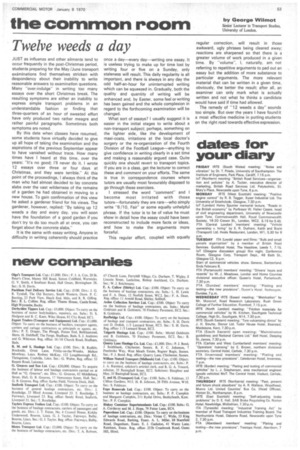the common room Twelve weeds a day
Page 59

If you've noticed an error in this article please click here to report it so we can fix it.
JUST as influenza and other ailments tend to occur frequently in the post-Christmas period, students preparing for the May /June transport examinations find themselves stricken with despondency about their inability to write reasonable answers to examination questions, Many "over-indulge' in writing too many essays over the short Christmas break. The resulting symptoms are either an inability to express simple transport problems in an understandable fashion or finding that three-quarters of an hour of sweated effort have only produced two rather meagre and rather painful paragraphs. Sometimes both symptoms are noted.
By this date when classes have resumed, some students have virtually decided to give up all hope of taking the examination and the aspirations of the previous September appear to have vanished without trace. How many times have I heard at this time, over the years: "It's no good; I'll never do it. I wrote 12 essays over three or four days at Christmas, and they were terrible." At this point of the proceedings, I always think of the man who had almost decided to lay concrete slabs over the vast wilderness of the remains of a garden he had obtained in moving to a new house. To gain confirmation of this view he asked a gardener friend for his views. The gardener, however, replied: "By taking up 12 weeds a day and every day, you will soon have the foundation of a good garden if you don't try to do too much all at once, you can forget about the concrete slabs."
It is the same with essay writing. Anyone in difficulty in writing coherently should practice once a day-every day-writing one essay. It is useless trying to make up for time lost by writing four or five on a Sunday, only staleness will result. This daily regularity is all important, and there is always in any day the odd half-an-hour for uninterrupted writing which can be squeezed in. Gradually, both the quality and quantity of writing will be enhanced and, by Easter, some feel or writing has been gained and the whole complexion in regard to the forthcoming examination will be changed.
What sort of essays? I usually suggest it is easier in the initial stages to write about a non-transport subject; perhaps, something on the lighter side, like the development of maxi-coats, irritations at the local doctor's surgery or the re-organization of the Fourth Division of the Football League-anything to give confidence in writing clearly in a set time and making a reasonably argued case. Quite quickly one should revert to transport topics. If you are in a class, get the lecturer to correct these and comment on your efforts. The same is true in correspondence courses where tutors are usually most favourably disposed to go through these exercises.
I stressed the word "comment" and I become most irritated with those tutors-fortunately they are rare-who simply write "6/10, Fair" or some equally unhelpful phrase. If the tutor is to be of value he must show in detail how the essay could have been reconstructed to include more facts or ideas, and how to make the arguments more forceful.
This regular effort, coupled with equally regular correction, will result in those awkward, ugly phrases being cleared away; reactions are sharpened so that there is a greater volume of work produced in a given time. By "volume", I, naturally, am not referring to repetitive arguments to pad out an essay but the addition of more substance to particular arguments. The more relevant material that can be written in a given time, obviously, the better the result; after all, an examiner can only mark what is actually written and not what he thinks a candidate would have said if time had allowed.
The remedy of "12 weeds a day" sounds too simple. But over the years I have found it a most effective medicine in putting students on the right road towards effective expression.








































































































